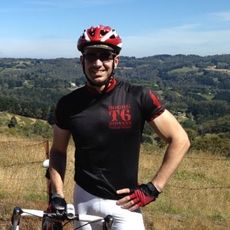
Dr Sam Whittle
Adelaide rheumatologist Dr Sam Whittle will be putting his body to the test when he joins other clinicians and pain scientists cycling on the 7-day Pain Revolution Rural Outreach Tour from Geelong to Wangaratta in Victoria next March.
The 40-person pelaton will cycle about 100 km a day, stopping at local communities to conduct public and health professional seminars on the latest understanding of persistent pain.
Dr Whittle, who has a special interest in fibromyalgia, told the limbic he is a keen cyclist and is both excited and daunted by the challenge.
“This is the first time I’ve had the opportunity to actually commit to do it. For me it combines two of my big interests – riding my bike and improving the care of people with chronic pain.”
“Since committing to it and looking at the course, it’s a really challenging ride so I am deep into some proper training now and it’s hard. But it’s supposed to be hard. Forcing those of us involved to go through a painful process is really clever,” he said.
He said persistent pain affects more than just the individual.
“It really does affect families and communities and I think part of the solution is really building resources and resilience back into those communities.”
“As a healthcare system, we have probably failed to do as well as we might have in the past and I think we are starting to learn that lesson. The complexity of pain requires complex solutions and that is best done at a community level.”
He said access to specialist multidisciplinary pain clinics was an important part of the chronic pain puzzle but not the whole part.
“The concept behind pain education is that it equips people with the skills to manage their own pain… but a lot of what we have done in the past is give people the idea that they ought to go and manage their own pain and that can be a bit isolating as well.”
“If you build in pain management skills and pain education that is broader than the individual but actually includes their family and their community and other care givers, then that provides that extra level of support and also consistency.”
He said chronic pain has to be tackled at multiple system levels.
“So we treat at a molecular level with medication but that is not a good solution in isolation. We treat at the brain level with CBT and psychological support and we treat at the whole person level with exercise, attention to sleep and physical therapy,” he said.
“But the thing that is often missing is we don’t then treat at the family and community level with education and support.”
The Pain Revolution Rural Outreach Tour is from 7-14 March 2020. Fundraising associated with the tour supports Pain Revolution’s Local Pain Educators program.